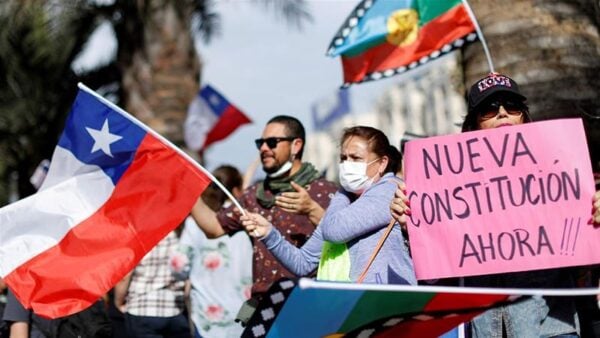
While Venezuelans are still suffering from the economic and political collapse of their ever diminishing democracy, the rest of Latin America has been mired in their own types of political problems. What are likely the most striking events have occurred recently in Chile. With a high cost of living and large divide between the wealthy and other economic classes, the tensions in Chilean society have boiled over. Even with the firing of the President’s Cabinet and moves to change the Pinochet era Constitution, Chilean protests rivals those of Hong Kong and Baghdad.
Known as the most stable economy in Latin America, Chileans have always lived in the shadow of the Pinochet era where the dictatorship and military cracked down on left wing political leaders by disappearing them, murdering thousands of citizens as well as an elected President and controlling the country to such a great degree, that even the modern Constitution operates in a manner to block any access to justice for victims of the regime. While Chileans always had a muted voice, it seems as if the recent protests may require more than just reforms of documents, it might need an acknowledgment of how society had laid dormant and wounded for generations. A catharsis of Chilean culture and society may be the only solution to protests that erupted after years of oppression and state run silencing of any challenges to the government. While there have been many reforms since the end of the Pinochet regime, it may not just be a youth protest, but a generational flood of pain and anger coming from a society that was crushed for the sake of economic progress in the 1970s and 1980s. Chileans did not suffer for the sake of modern inequality, the President should consider this if any solutions will be found.
In Bolivia, the long term left wing President Evo Morales has landed in Mexico where he was granted asylum. Morales was accused by the OAS of rigging the last election, and with social unrest in the country coming to a boiling point and Morales not willing to leave, by any means necessary, heavy protests ensued and the military formally advised him to leave the country, for the sake of the country. While there is a running debate by foreign political leaders as to whether or not this is a coup or a military operating to entrust the will of the people to another election, it seems that local political preferences outside of Bolivia will not deter a change of government in Bolivia. Morales’ pro-Chavista government of almost a decade and a half may present another candidate and continue the same issues faced by Bolivians, but it seems as if a new election can be held, it will release a lot of tension currently simmering in Bolivian society.
Brazil’s famous former President Lula was released from jail in a legal case that would be a complicated final exam thesis for any legal expert in Brazil and abroad. While the explanation for his release comes from an inability to apply all of his legal options before going to prison, mixed with the accusation that the judge who put the legal talons upon the former President was bias in the application of the law, Lula may still share two very different fates. Lula may be able to run for President of his PT party again in a few short years or may return to jail for another corruption charge. While the leaders of Chile and Bolivia may be looking at Brazil and making sure they do not get tangled up in their own legal issues, it is Brazil that is suffering through a process to deter corruption while facing political and economic elites that are comfortable with the status quo. In the end, voters and protestors need to choose their future wisely if they are able to achieve the change they seek in their countries.